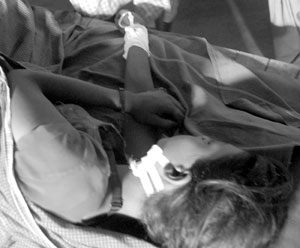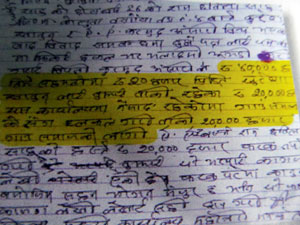 CIJ GETTING AWAY WITH IT: A 13-year-old girl in Mahottari who was raped at knife-point by a neighbour recovers in hospital. Police said this was a "normal" case. |
Two years ago in Mahottari, a young woman was forced into a sugarcane field and raped by Farmud Ansari and Murduj Ansari. They were caught, but instead of punishing both of them, locals padlocked the girl's house and expelled her from the village for having "corrupted" local youth. After seeking help from police and political leaders, the girl got a compensation of Rs 40,000, half of which was taken by the mediating all-party leaders as a donation for their 'community development fund'.
The local representatives of the TMLP, Maoists, NC, Madhesi Forum and UML all signed the agreement for compensation in the presence of the head of the Women's Cell of the local police. And as a 'reward', the locals tried to force the girl to marry one of the men. Mahottari's police chief said: "The best alternative was to allow the victim to re-assimilate herself in society."
Another young woman from Laxmipur of Rautahat was forced to marry her rapist, Sagar Darji, under pressure from the local administration and civil society organisations, including gender rights activists. Police chief Pradip Kandel said: "It is not possible to deliver justice in all rape cases.Sometimes we need to find an alternative mechanism."
'Alternative mechanism' has now become an euphemism for letting rapists to not just get away with their crime, but actually take the rape victim home with them. And the most outrageous aspect of this is that it is aided and abetted by local politicians, police and even human rights activists.
"The rapists who come from powerful families never get punished, the victims who are poor never get justice because the police themselves work to cover up the crime and work out an arrangement," says civil society activist, Madan Jha. Other activists say rape is not a sexual crime, but projects violence and power deeply-rooted in the Tarai's patriarchy.
Earlier this year, a 17-year-old girl in Mahottari's Bairganiya village was raped by 25-year-old Ranjit Das who also filmed the incident and circulated the minute-long video via mobile and YouTube. When local authorities were informed about the crime, instead of punishing the accused, they collaborated with local bigwigs to force the victim to marry the perpetrator. Das is now in custody, but the video is being sold from phone to phone, and has even reached Nepalis in Qatar and Malaysia.
In August, another 17-year-old girl from the same district was raped by Ahmed Miya, who got his friend to record the act on his mobile phone. By coincidence, a young man from their village saw the video on a phone in Qatar and alerted the girl's family. But instead of arresting the accused, important men in the village forced the girl to marry her rapist.
 This agreement between a rapist and his victim's family was mediated by an all-party committee that awarded Rs 40,000 to the victim, but took away half the amount for their 'community development'. |
In many cases, the rapist stands to make a lot of money selling videos of the crime across the border in India, and the spread of mobile phones has made it easier to record and disseminate such explicit material. Many of these sexual predators don't just go scot free, but are rewarded, emboldening criminals who are now killing the victims after raping them.
A 18-year-old girl from Mahottari was gang-raped in broad daylight while carrying water from the communal well recently. "I noticed they were taking a video of me with their phones as I struggled," she recounted to police. She named her rapists as Hajrat Kawari, Dil Mohamad Kawari, Dawud Kawari and Kalmuddin Kawari. Police arrested all of them and took their case to the district police office. But the girl's family withdrew the complaint after powerful locals put pressure on them. "They threatened us, we are poor what can we do? So we withdrew the case," the girl's mother said.
There have been 11 rape cases registered in Rautahat alone in the past year, of which nine have been settled by written agreement after the victim's family was threatened. All 17 rape cases registered at the Women's Cell of Rautahat Police have been suppressed because of local pressure. In Mahottari, there are 16 rape cases that are pending in the courts for the past three years. Because the police have become complicit as mediators, many victims now take their cases to a women's rights group in Jaleswor where there are 37 cases registered.
Earlier this year, a 14-year-old student was found to have been repeatedly raped by her school teacher. When found out, locals and police mediated and forced the teacher to marry his minor victim. Another 13-year-old girl in Mahottari was raped inside her own house by a neighbour, Samsul Nafad, who threatened to kill her if she reported it. The girl's father saved her life by rushing his bleeding daughter to hospital. Even though Nafad was later arrested, Jayanarayan Yadav of the area police post initially dismissed the complaint: "This happens all the time, it's a normal case."
For the complete Nepali version of this piece from the Centre for Investigative Journalism, click here
Read also:
Patriarchy in the political hierarchy, ANURAG ACHARYA
The exclusive behaviour of powerful Madhesi leaders ridicules the inclusion agenda they claim to champion


